July 2021
Sophie Bridger served as a Human Rights Monitor with the Ecumenical Accompaniment Programme in Palestine and Israel in 2019. During her time in the West Bank, she observed numerous human rights violations, and witnessed the impact of ongoing occupation on children and local families. Since her return, she has talked about what she witnessed in the West Bank and advocated for a just peace in the region.
EAPPI are recruiting again. Click here for more info.
Sophie Bridger:
Thank you so much for inviting me. And thank you to the Balfour Project for hosting us. It’s a real privilege. My name is Sophie and I spent three months in Palestine and Israel end of 2018 til about January 20219. I think it’s pretty important to talk about the circumstances that basically led me to be in Palestine and Israel, because I think that very much changes the sort of lens that people will talk about the region, what we saw that for example.

I was a human rights monitor and a witness. That was my reason for being in Palestine and Israel. I was in the West Bank in particular to monitor human rights abuses from the Occupation and to hear about how the conflict impacts on people. And the programme I with is the Ecumenical Accompaniment Program in Palestine and Israel. Now that’s a programme run by the World Council of Churches and the lens that takes is very much a human rights one. It focuses entirely on human rights and the aims of the project are basically to advocate for a just peace in Palestine and Israel.
So that’s really important to know, I think as the lens that I take, it’s not a pro-Palestinian programme. It’s not a pro Israeli programme. It’s just a human rights programme.
So I spent some time in Israel, but most of the time I was in Palestine, I was in the north part of the West Bank. So for those of you who are not as familiar with the geography, you can see the West Bank marked on this map in green. And I was in the top part of that, near Nablus. If you have questions about Jerusalem or Gaza, you can ask me about that because I will have an opinion, but my insight comes from my experience as a witness in the West Bank.
I’m not an academic, I’m not a lawyer, that’s not my expertise. I’m a witness. I can tell you what I saw. I can tell you what I was told in that area.
And it’s particularly important to me that we talk about the stories of people’s experiences, because I think the media in particular often talks about very high level descriptions of the conflict. Things become quite generalized. I think we saw that in the recent conflict in Gaza, in particular, we talked about, the number of people who had died. We talked about what Netanyahu did, we talked about what Hamas were doing, but we didn’t hear about what it was actually like to live through that conflict and those stories of people’s experiences and what their lives are like are really important. So that’s what I’m going to try and share with you today.
I will also give a brief content warning that there will be some discussions of violence. There aren’t going to be any graphic pictures, but if you need to take a step out that is absolutely fine. Please do that at any time that you need to.
So I think I’d like to start off by just telling you a little bit about the West Bank. I think this is a fairly typical picture of what most people expect of the West Bank. It’s a highly urban area. Certainly in this photo, it’s highly urban. You can see the Separation Barrier running down the middle. You can see a watch tower. And that is what some parts of the Westbank look like, but it also looks like this.
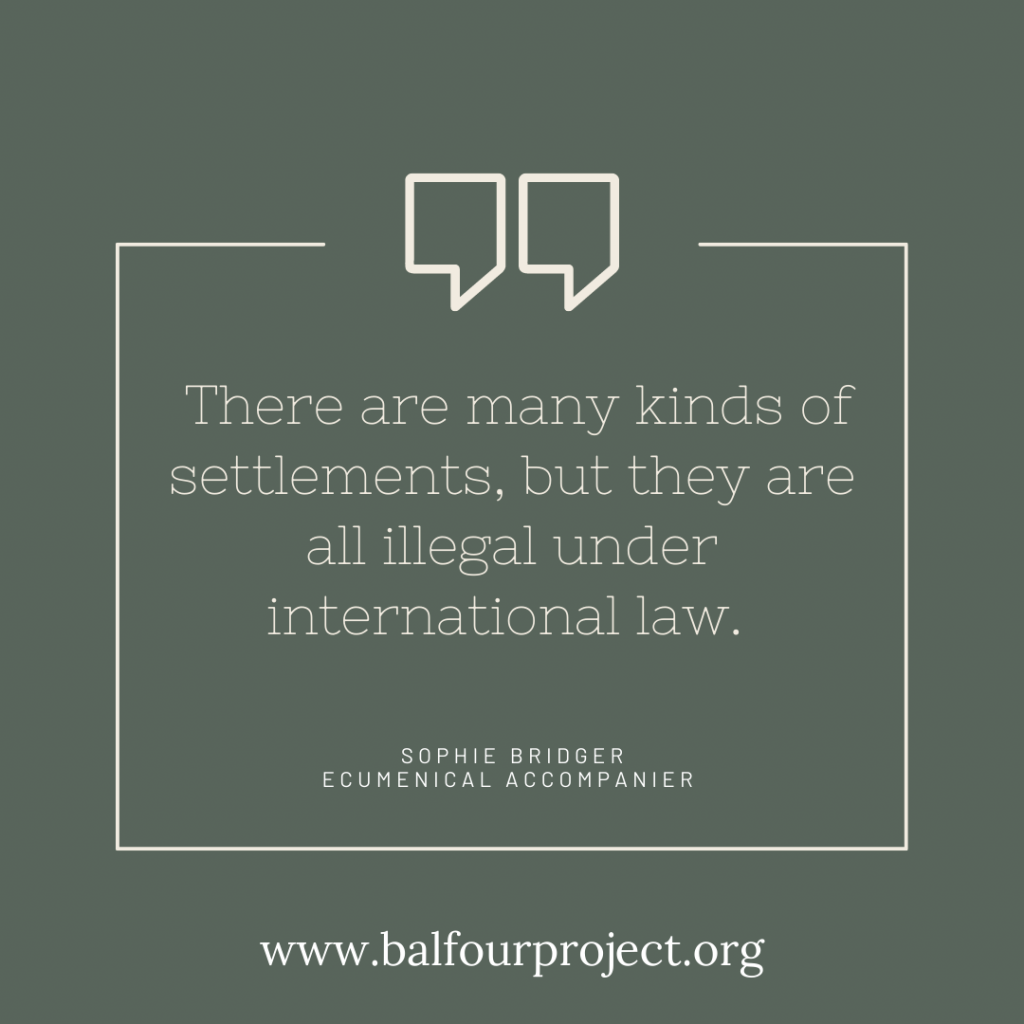
So this is where I was stationed for three months; you couldn’t really get more different. This is a beautiful, beautiful part of the West Bank overlooking the Jordan Valley. And this is the area that I was in, a rural selection of villages in the Northwest that I felt very, very privileged to be able to live in and call my home for three months. About 5 million people live there. So it’s about the size of Scotland.
And the West Bank also looks like this. This is a village Burin. It’s not far from where I was living. And it’s what I would say is pretty standard. Just a fairly average village in the north of the West Bank. It has homes. It has a school which is in the photo here, the yellow building at the front. There’s a mosque. I think maybe 2000 people live here maximum. Many of the people live here grow olives as either part or a major part of their income. It’s just a fairly standard part of the West Bank, but it’s where the story that I want to share today comes from.
So let’s meet one of the inhabitants of Burin. This is a man called Ibrahim. Ibrahim was the head teacher of Burin Secondary School. I say was because I sincerely hope he’s had the opportunity to retire by now. When I met him two years ago, he had just been convinced to stay on for a little bit longer because he was considered to be such an important part of the community. And he was doing such amazing things for the school. It was just a really lovely, soft spoken man who cared a great deal about the school and the students and was always setting up initiatives and things that would help.
The students actually just have a, a nicer, more beneficial time at school, including greenhouses and including the school band, which I can, I can show you here. This is the school band of Burin trying out their new instruments. I can vouch for their enthusiasm, though not necessarily the talents. They were an absolutely delightful bunch of kids though.
Now if you look a little bit closer, you can see in the background a couple of things. So if you look on the top of the hill, you’ll see some houses. And if you look just between the trees on the left, you’ll see a military tower. So why is there a military tower here on the edge of a school playground? As many of you will already know in 1967, the Israeli army invaded and occupied the West Bank and they have complete control over about 60% of the area.
So we use the word Occupation a lot without actually unpacking what it really means, both legally and in practice. So legally Occupation means the temporary placement of territory under the control of a hostile army. But in practice, what that means is that the military are totally in charge of the day-to-day lives of people in Burin. They control where the people in Burin go, so they can set up checkpoints inside or outside the village to stop people entering or leaving if they would like. They can take land away from the village. In fact, the military tower is actually built on land that was confiscated by the army in 2013 from the school. That land used to belong to the school. They’re responsible for enforcing security and justice for Palestinians. So if Palestinians have any interaction with the justice system, which – spoiler – it’s usually not a positive interaction, that’s going to be through the military.
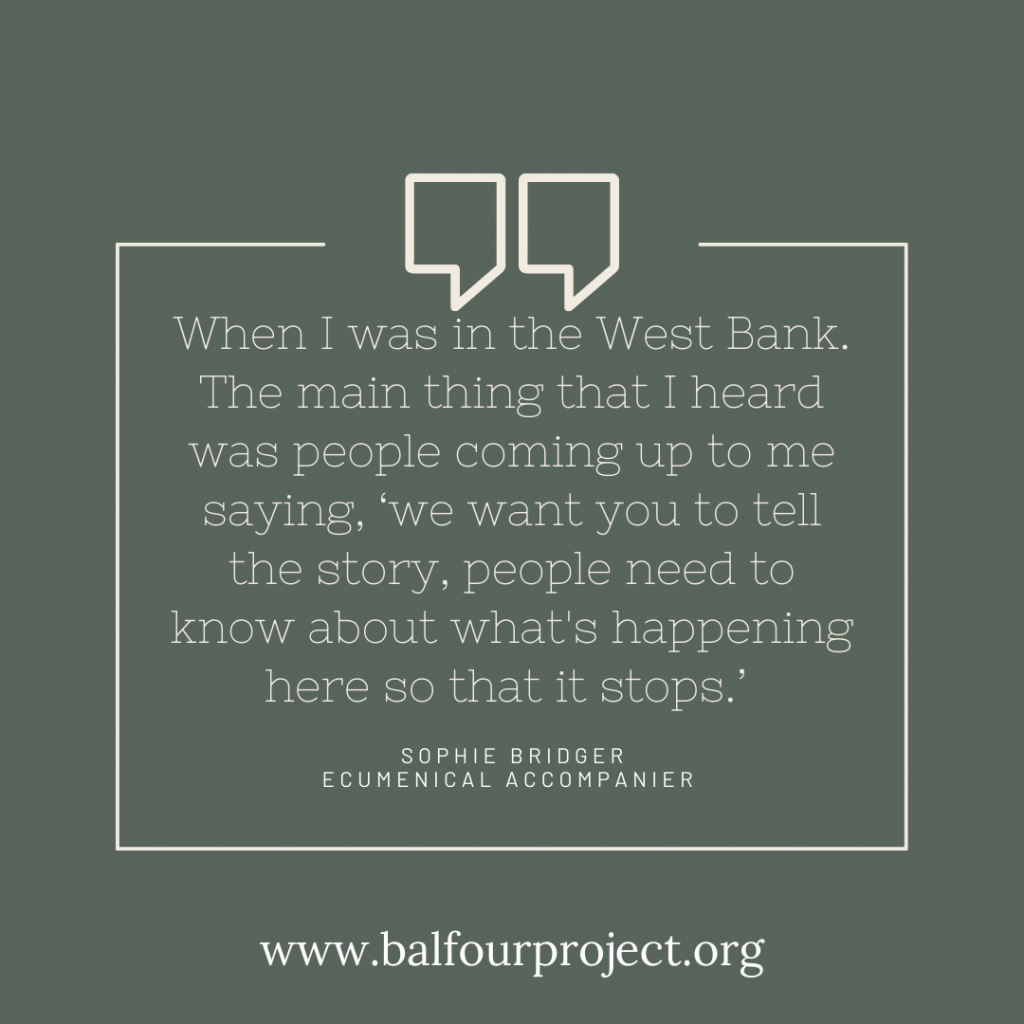
So they control basically all parts of day-to-day life in Palestine, particularly in the West Bank. So the soldiers see this military tower as a way to monitor what’s going on in the village to help them to control what’s going on. Their concern and the reason that they see for being there is not anything to do with the safety of the Palestinians, it is to do with the safety of the people, living in the houses at the top of the hill. Now this is an Israeli settlements, which has many of you will already know is illegal under international law. It’s illegal for the occupying army to either move their own population into the area or to move the population that lives in the West Bank out of the West Bank.
So that settlement is entirely illegal under international law. Technically the role of the soldiers in that tower is to keep the people in the settlements safe. That’s a really important theme. They are there to protect the settlers, not the Palestinians. The other thing that I think is really important to know is that the soldiers obviously do not stay in the military tower. They make fairly regular incursions into the school.
So I’m going to tell you now about a time, an incident that Abraham told us about occurred in, I think March 2018. This is another view of the school. You can see the buildings down the bottom here. The green grass and foreground is a playing area for the children. You can see some barbed wire and you can see the military tower again. So it was March and the children were playing on this part of the grass. And at some points, the soldiers came down from the military tower and started poking their guns through the barbed wire to try and intimidate to the children, I can only presume. When I say guns, what I would like you to imagine is the soldiers use something called an M16 rifle, which is a military grade rifle. That’s the same thing used by the American army. And every combat soldier I saw in the West Bank – and I saw a lot of them – was carrying one of those and they all loaded and they were pointing them through the barbed wire. And again, I can only presume to try and intimidate or provoke the children. And at one point one of the students threw a stone at one of the soldiers. And that’s the point where the army tear gassed the school.
This is what that looked like. Tear gas is essentially a vapourised acid. So it’s very irritating. If you can imagine breathing in acid, that’s what it feels like. It irritates the lungs, irritates the eyes. It’s a pretty horrific experience. And it diffuses, obviously it’s a gas. So it drifts throughout the school. Most of the children were badly affected by the tear gas and the Palestinian Red Crescent, which serves as an ambulance and emergency service for the West Bank, came to attend to them, to help treat the symptoms and to help them calm down, because it’s very distressing. The part of the school that you can see here is the part which has the youngest students. It’s a secondary school, so they would have been about 12. This part was actually the worst effected. As well as using tear gas, the army also used rubber bullets. One child was shot in the face with a rubber bullet, he was 13. Fortunately he was taken to hospital and has made a full recovery.
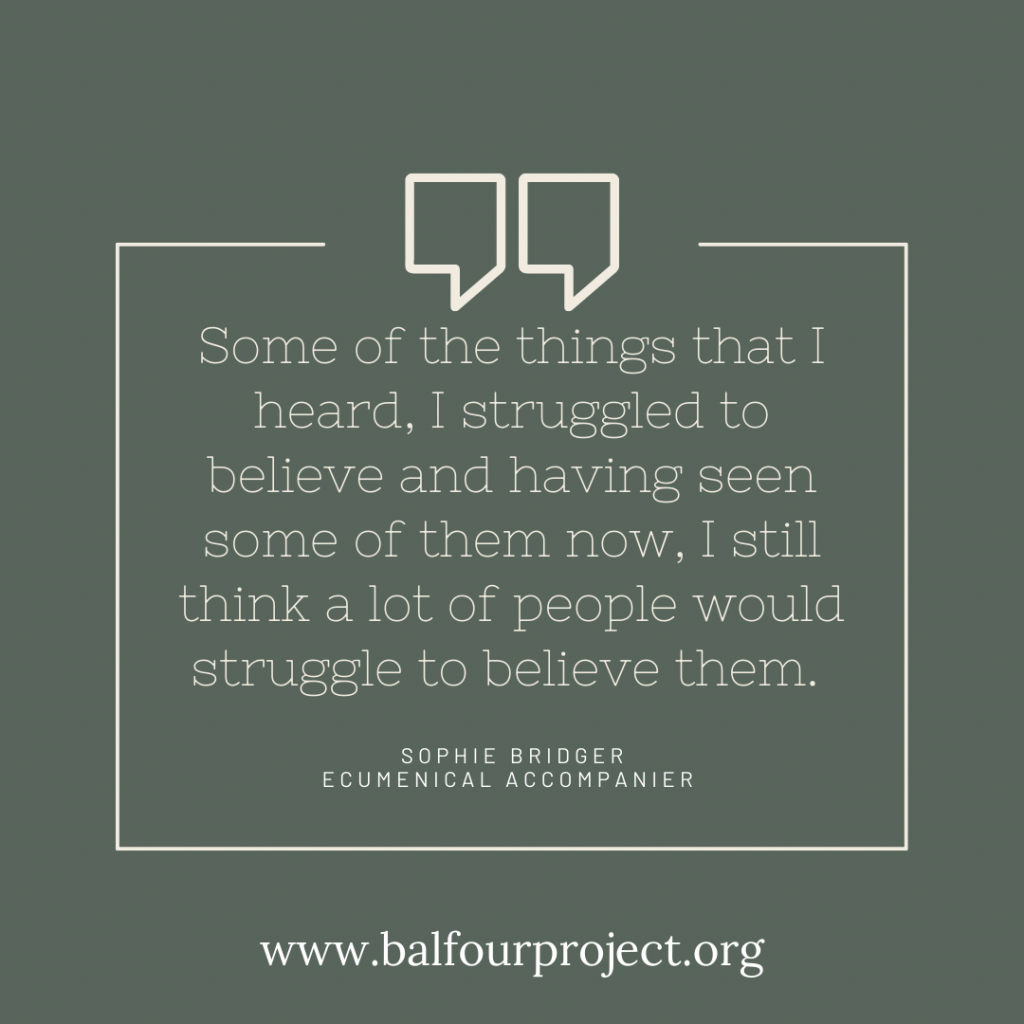
So as you can imagine, that was very distressing for the children. And Ibrahim got many phone calls the next day from parents who just said, ‘I’m sorry, my children aren’t coming in today, they’re too upset. They don’t feel safe. They’ve had nightmares, they’ve been wetting the bed.’ So it has an enormous impact on how they felt. And it was clearly a very distressing experience for all of them. Over time, they did start to feel safer to come back into school, but Ibrahim gave us a really eloquent explanation of fact that their grades slipped, they weren’t really there. They were sitting at their desks, but their minds were somewhere else. They kept looking out the window, looking at the military tower and presumably wandering about what might happen next. So it was clearly a very distressing experience for all involved, and it has an enormous impact on their schooling.
This is a horrific incident that it’s actually not uncommon. Here is an illustrative quote from UN Office of Humanitarian Affairs from 2018. This sort of incident was happening around once a week. So let’s say two violations every week. And around half of those involve live fire tear gas or stun grenades fired into or near schools by Israeli forces. This wasn’t even the only incident that happened in this school that year. It was unfortunately incredibly common. It’s very upsetting, but it is not unusual.
And I think when we all look at this, we go, ‘why is this happening? How is this happening?’ Because in fact, there are laws in place to stop this. There are laws, international treaties that are specifically put in place to protect children in these kinds of situations, because it is an appalling thing to happen. Children are specially protected under international law. So they are protected by the UN Convention of the Rights of the Child, which Israel has signed up to the UN Declaration of Human Rights, which specifically addresses and protects the right to an education, even the Geneva Convention which actually specifically states that schools are supposed to be supported to keep working during a conflict. And an Occupation is classed as a conflict by the Geneva Convention. The UN actually classes attacks on schools the same way that they view attacks on hospitals. They are a grave violation of rights, and they’re not considered acceptable by the UN.
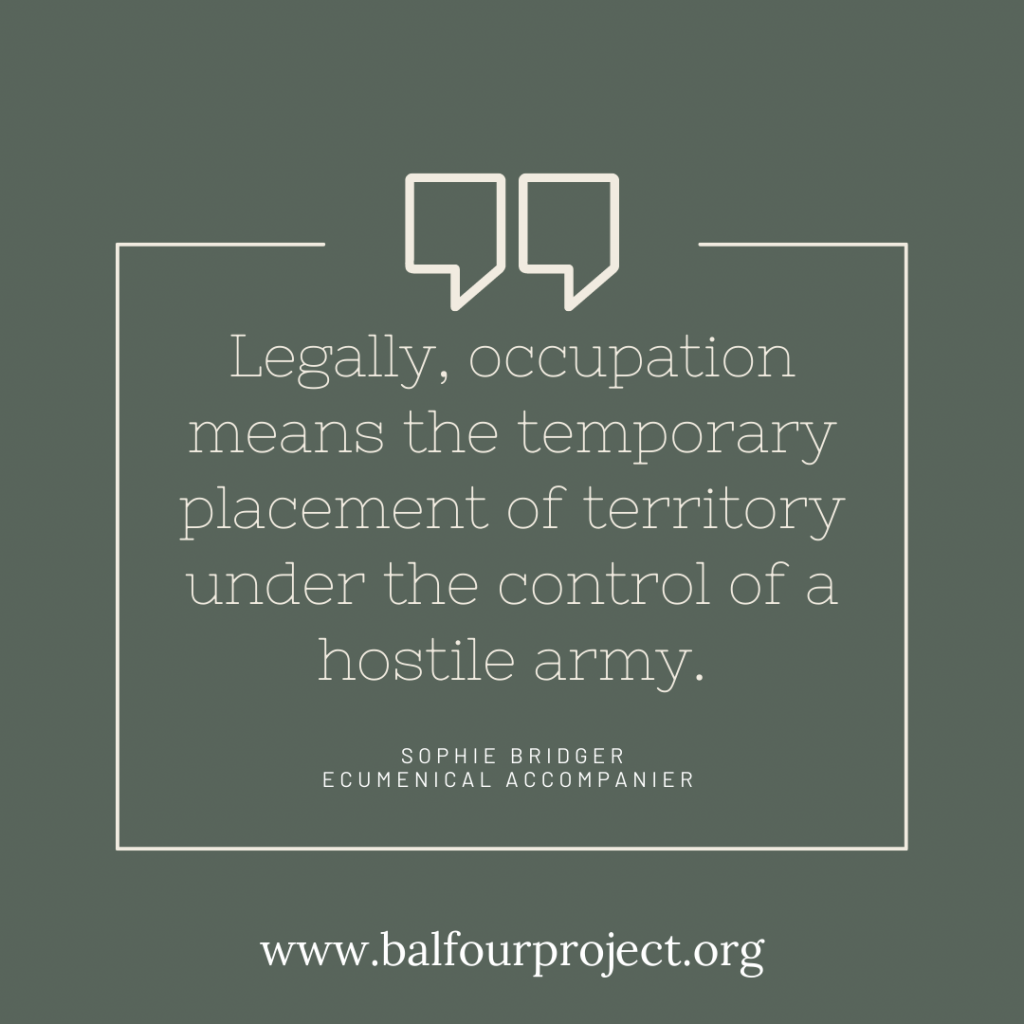
So all of these laws and all these treaties are in place and the state of Israel ignores them and does not abide by them at all. There are laws in place which are being broken.
So why, what possible justification is there for tear gassing a school. When I have seen either a spokesperson from the Israeli military respond to a situation like this, and certainly this is usually the response they give, they say, ‘stone throwing is very serious events. If it puts our people at risk, then we have to respond to that.’ And I can totally understand that response in that I can totally understand that everyone needs to feel safe and you need to respond. If someone jeopardises your safety. However, if you need to respond, then laws like this and international treaties like they’re set out quite clearly what you cannot do as a response. If you want to respond to a child, throwing a stone, these are not justifiable actions. They are not steps you can take. And secondly, I would question rather whether this is a proportionate response to a child throwing a stone to tear gas and entire school. I would question whether that is proportionate or reasonable.
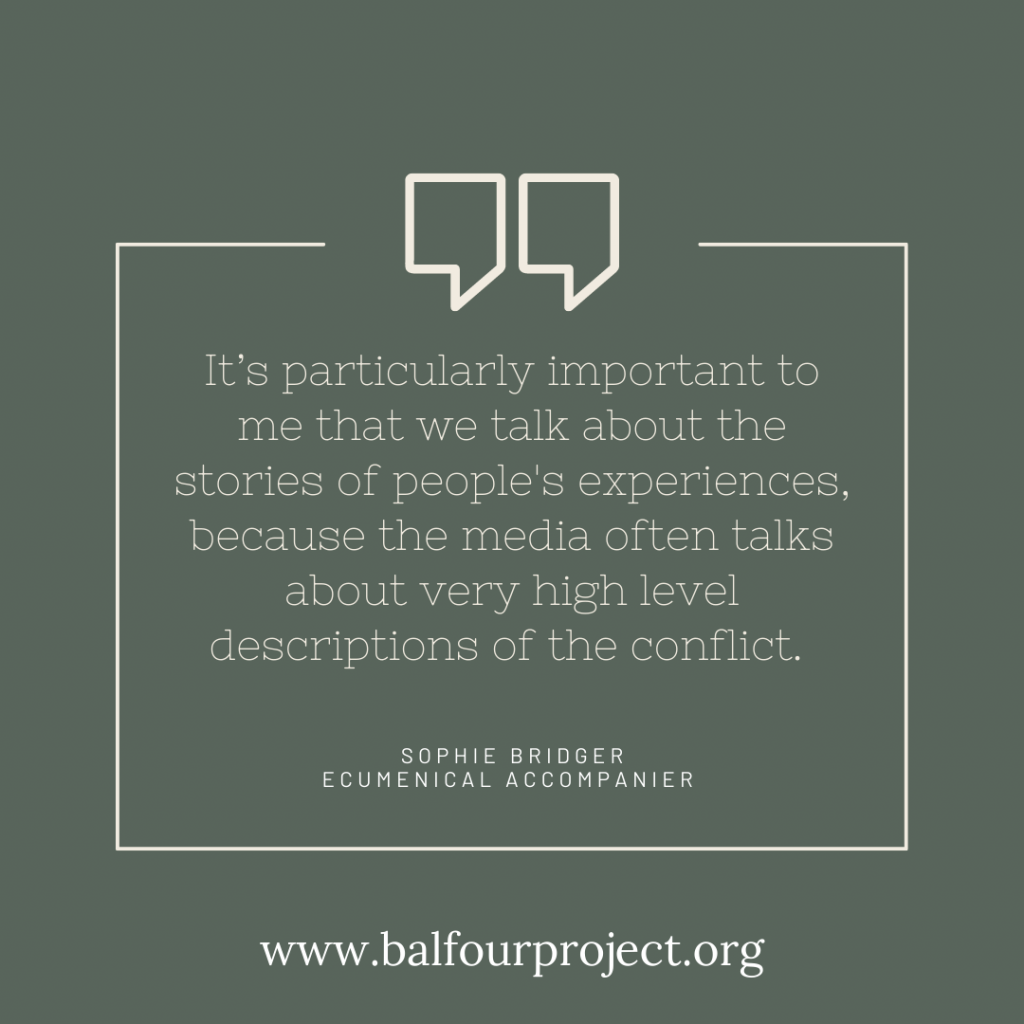
So before I did this presentation stay, I took a look at actually how things have changed in the West Bank. Since I left. I left in 2019 before Britain left the European Union, before COVID. I wanted to know what had changed. And unfortunately it wasn’t a lot. So this is a piece of research done by the Norwegian Refugee Council, which shows that actually attacks on Palestinian schools are still happening. And in fact, they had an example of another child in Burin Secondary School, which had been teargassed again, and he’d been hit in the head by a tear gas cannister, and a tear gas cannister is significant thing. That’s the main way that people come to serious harm when they are experiencing tear gas is to be hit by a canister. So that could be essentially quite a serious injury.
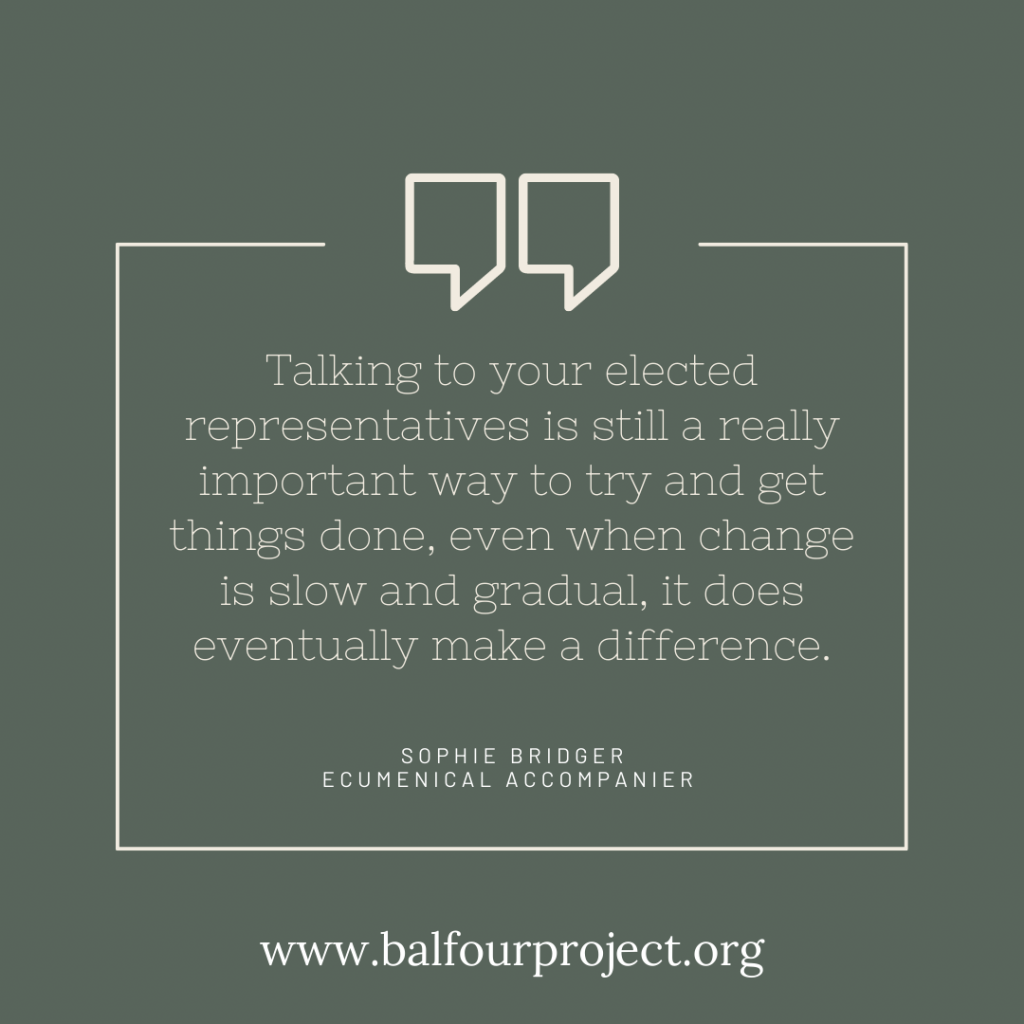
So these things still ongoing. The other thing that is still ongoing is unfortunately attacks by settlers. Burin, as you could see, had a settlement just above the school. It’s actually between two Israeli settlements, one called Yitzah and one called Bracha. And the settlers come into the village or approach the school and that has continued or perhaps even escalated over lockdown. B’Tselem, the human rights organisation in Israel have documenting that really well.
So I’d like to just show you a brief video to kind of illustrate this.
So these are Israeli settlers from the local settlement and the soldiers around them. Now the soldiers, as I mentioned earlier are there to protect the settlers who have actually come into the village. Soldiers can’t actually arrest Israeli citizens. That’s a little fun fact for you. You can see the soldiers. These are the sorts of weapons I was talking about earlier. This is an M16.
You can see the settlers have come into Burin and are throwing stones into the village, including at people’s houses. One has a slingshot on the far right of the screen. We just had a story of how a Palestinian teenager threw a stone at a soldier, and they tear gassed the whole school as a result and hear we have soldiers standing by while Israeli settlers throw stones at a whole village.
This was taken in May. There was actually a similar video on the B’Tselem website of them doing very similar thing about two weeks ago. So as you can see, this is a very real issue. Very common issue.
I’d like to let you know a little bit about, what I did and what others in the program did while we were in the area. This is myself on the left and my colleague, Jess on the right, walking outside a school in the West Bank. We did that three times a week, to actually walk outside the school with the young people as they were going to or from school to help disincentivise anything kicking off, because usually these guys on the right would be there as well. There would be somewhere between three and six soldiers, normally again with military grade rifles, which were loaded either standing by the side of the road, sometimes blocking the path. And so we went there as often as we could to try and make sure that no child actually thought it was a good idea to throw a stone, but also to make sure predominantly that soldiers didn’t think it was a good idea to start acting aggressively towards school children.
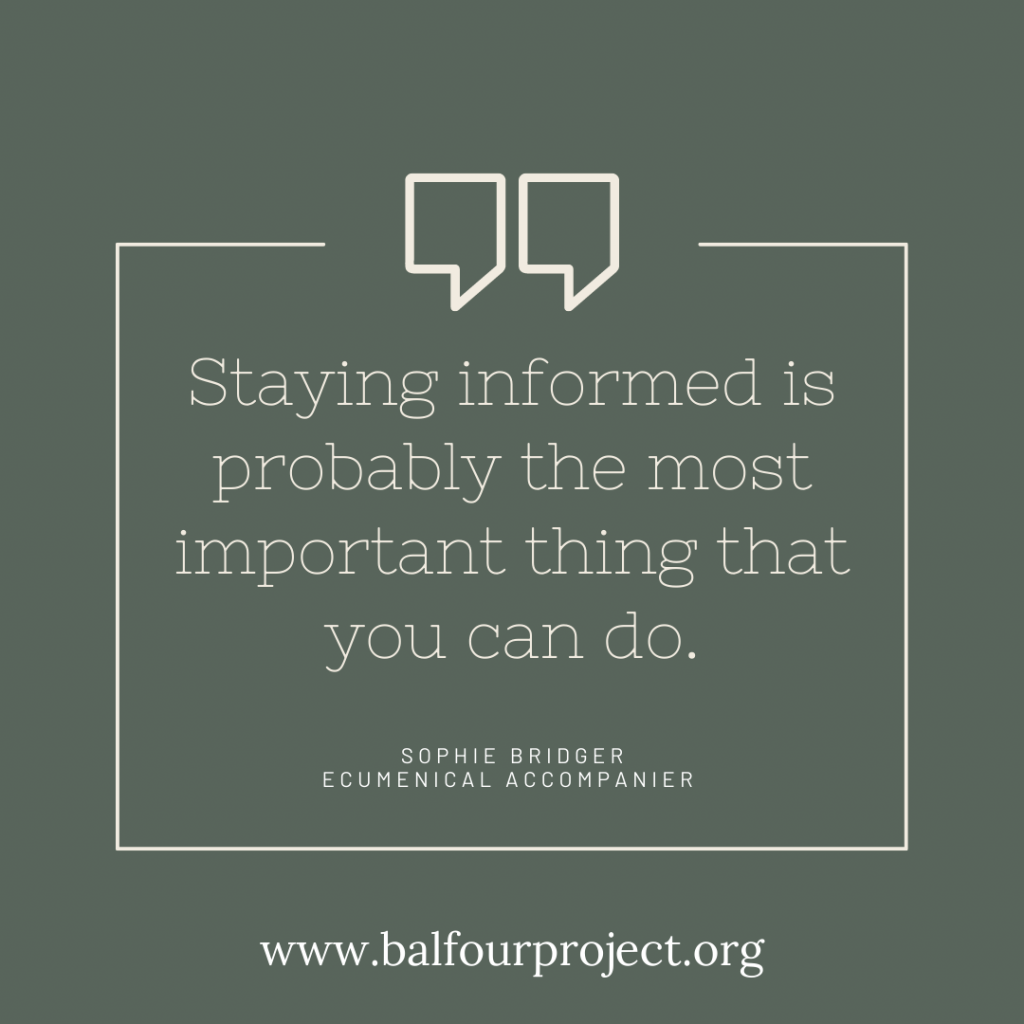
Sometimes they did. We had, for example, a story of a student who was picked up on his way back from school by a member of the IDF who thought he’d seen someone similar looking throwing a stone. We went to go speak to him about what his experience had been afterwards. He told us that he’d been kept for several hours, questioned, and for letting him go, they hit him in the face with the butt of their gun. So this is not academic question of, ‘oh, it’s a bad thing that soldiers are there.’ The soldiers were frequently acting dangerously towards the young people at the school.
So we went to schools that actually invited us. We visited Burin School a good number of times as well on Ibrahim’s invitation. They said that actually, they felt really helped that it helped keep incidents down. And they were really grateful to have us. We were very pleased to be there as well. This is what I was talking about earlier as a protective presence. And it’s something that functions often as an act of using privilege. And it’s quite an upsetting way to think about it in many ways, but you can see that actually I am as a white lady who speaks English with a jacket on that says I’m there with what will either be interpreted as a human rights program or a Christian program. I am at much less risk. I am unlikely to be the subject to force from the IDF, unlike the children that I’m walking alongside. And therefore, if I can walk with them, I can for a little while, keeps them safe. By and large, it is very effective. And as I say, the teachers were, were very glad to have us there as well.
And I think it’s really important to talk about the fact that that actually not all Israelis support the Occupation and not all Israeli support the actions of the Israeli military. Israel has a slightly complex relationship with the military because it has conscription. So every Israeli citizen with a couple of exceptions will go through the Israeli military and their children will go through the Israeli military. That really changes the way that the public sees the actions of Israeli soldiers. Because if you see yourself as a reasonable person and your child as a reasonable person, and you’ve both been in the military and you don’t think that you would behave unreasonably, you wouldn’t do something violent unless there was a very good reason to, then surely those soldiers won’t either. And so that really changes the way that the public looks at these kinds of actions.
But there are Israelis that take action. So for example, this is Rahel Rabin. She is a conscientious objector, and this year she was sentenced to a hundred years in prison for refusing to take up a role in the IDF because she disagreed with the Occupation.
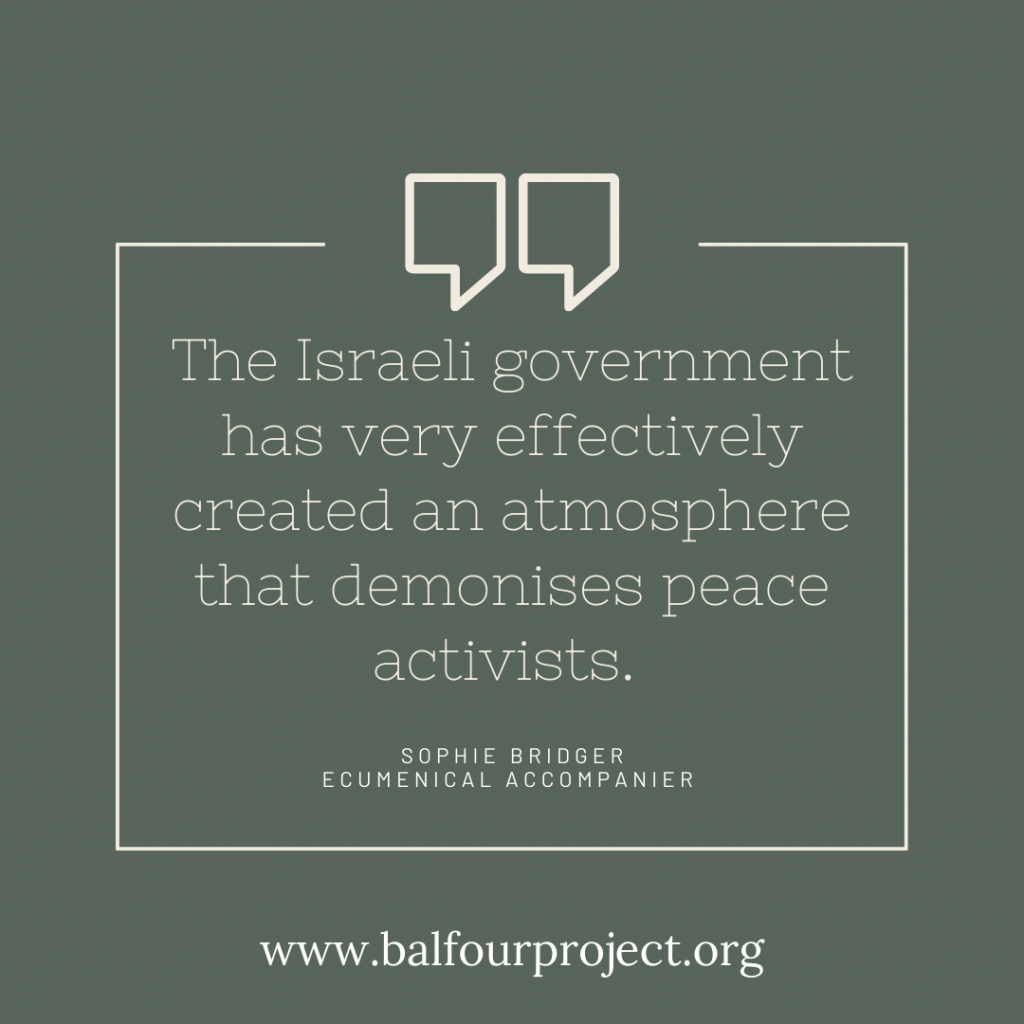
On the rights as a logo for Breaking the Silence, who are an incredibly important organization, in my opinion. They’re made up of former Israeli soldiers who talk about the things that they did, were asked to do, to try and raise awareness of the circumstances that they work in, the things that’s are often enormous human rights abuses. And they do this to call for an end to the Occupation.
Now the Israeli government has very effectively created an atmosphere that demonises peace activists like Ms Rabin and like Breaking the Silence. It makes it very difficult to call for an end to the Occupation within Israel, which is why I think it’s very important to talk about the voices that are doing that in Israel. Both Israelis and Palestinians as well. Because if the Israeli government is trying to drown those voices out and we also have a responsibility to try and raise them up and show that actually they don’t have the support of an entire state behind them.
And I also think it’s important to note that there are always things we can do. We can always try and no matter how desperate the situation feels, there are always things being done. There are always things we can support and includes you. And I’m very grateful to you all for giving up an hour of your time to come along and hear a little bit about what I saw and what people experienced in the West Bank. Because I would like to say that staying informed is probably the most important thing that you can do.
Before I became involved in work around Israel and Palestine, I would consider myself very uninformed and I actively avoided engaging in the topic because it felt totally overwhelming. I didn’t know what sources I could trust. I didn’t know who was telling the truth. I didn’t know what was going on. And some of the things that I heard, I struggled to believe and having seen some of them now, I still think a lot of people would struggle to believe them.
But keeping yourself informed is the best way to start that journey of taking action. Share what you know with others. And when you see circumstances, for example of military incursions in schools, email your MP, ask them to raise it with the foreign office, because that does make a difference. It starts to chip away at what the Israeli state is doing. You can ask them to raise this in general, or you can ask them to raise it when you see specific instances of the military attacking schools.
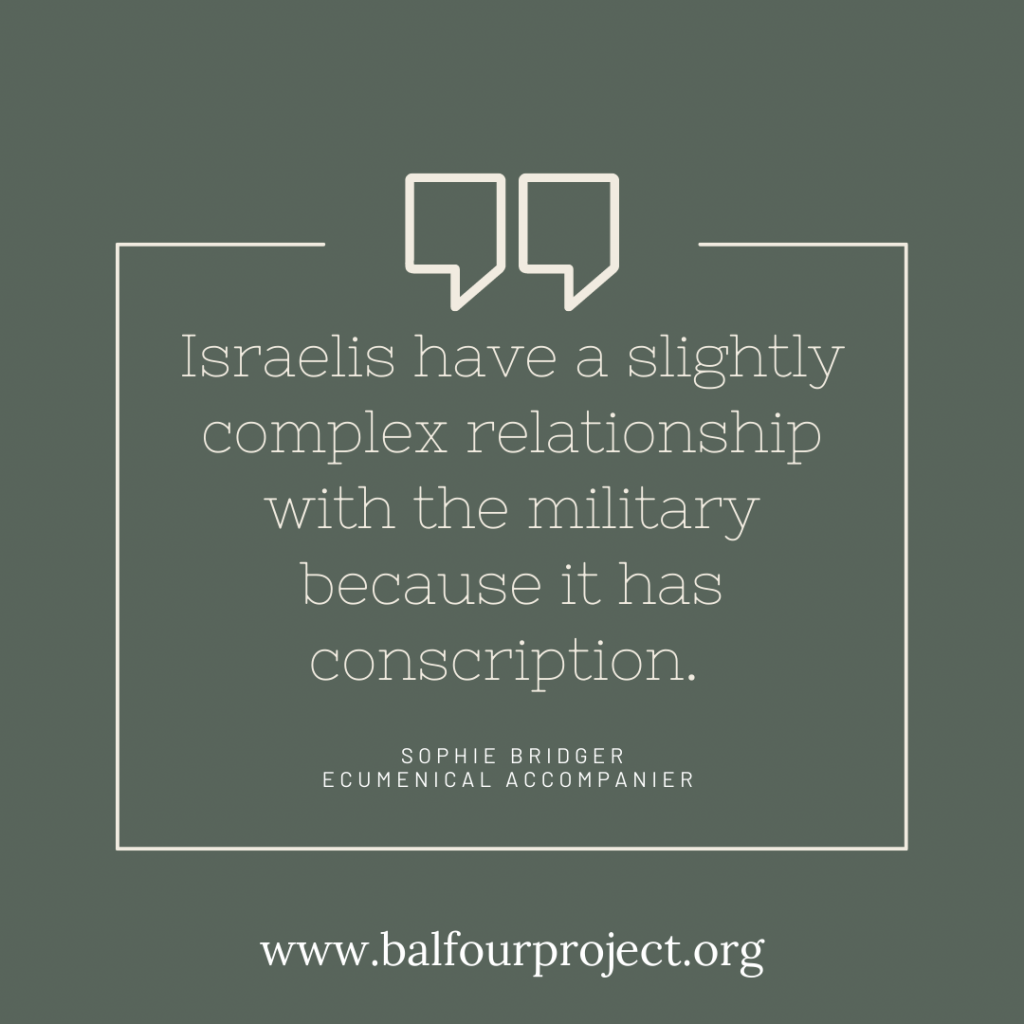
You can also sign up to emails for more information. EAPPI does some great emails and they also have some fantastic blogs. I actually wrote this story up initially as a blog. So there are lots of great stories coming in from the grassroots of what’s going on in Israel/Palestine.
But for now, I’ll just say, thank you all very much for giving up an hour of your time. It means a great deal to me to be able to share what I saw and what I learnt with you. When I was in the West Bank. The main thing that I heard was people coming up to me saying, ‘we want you to tell the story, people need to know about what’s happening here so that it stops.’ And so by taking the time to come today, you’re helping me fulfill that promise that I made to try and tell as many stories as I could. So thank you. I really look forward to seeing what questions you have and apologies again for the technical difficulties. I hope it didn’t stop your enjoyment too much.
Diana Safieh:
Hello. right. Yes. I echo that apology. My first batch of questions, there’s been a few that have come in about the EAPPI programme specifically. How you get involved in it. Do they have a maximum amount of people that they send to a specific area at a time? How is that organised and structured? And also what are the expectations of you when you return? I understand you’re meant to speak to a certain amount of people. So please do tell us a bit more about that.
Sophie:
Okay. So I think the first question was basically how many people does the EAPPI send and to where. EAPPI normally takes a group of, I’m not sure quite how many it varies year on year, depending how many people apply. I think somewhere between 20 and 35 that are spread across the West Bank is about standard. And exactly where those people go is dependent on need, dependent on where people can be put. But also we always go by invitation. So I was near Nablus, which has a thriving Christian community who really, I think, felt strongly that it was positive to have a group on the ground supporting them. So that was one of the reasons that we wen.
In terms of expectations of us when we return, we are asked to speak about what we saw. We are asked to speak truthfully about what we saw and advocate for justice and peace. And we are given as many resources as possible to help us do that and to help us do that in a way that is that draws on the strength of what we saw, but also challenges us to go, ‘well, okay, you saw this, but did you see that?’
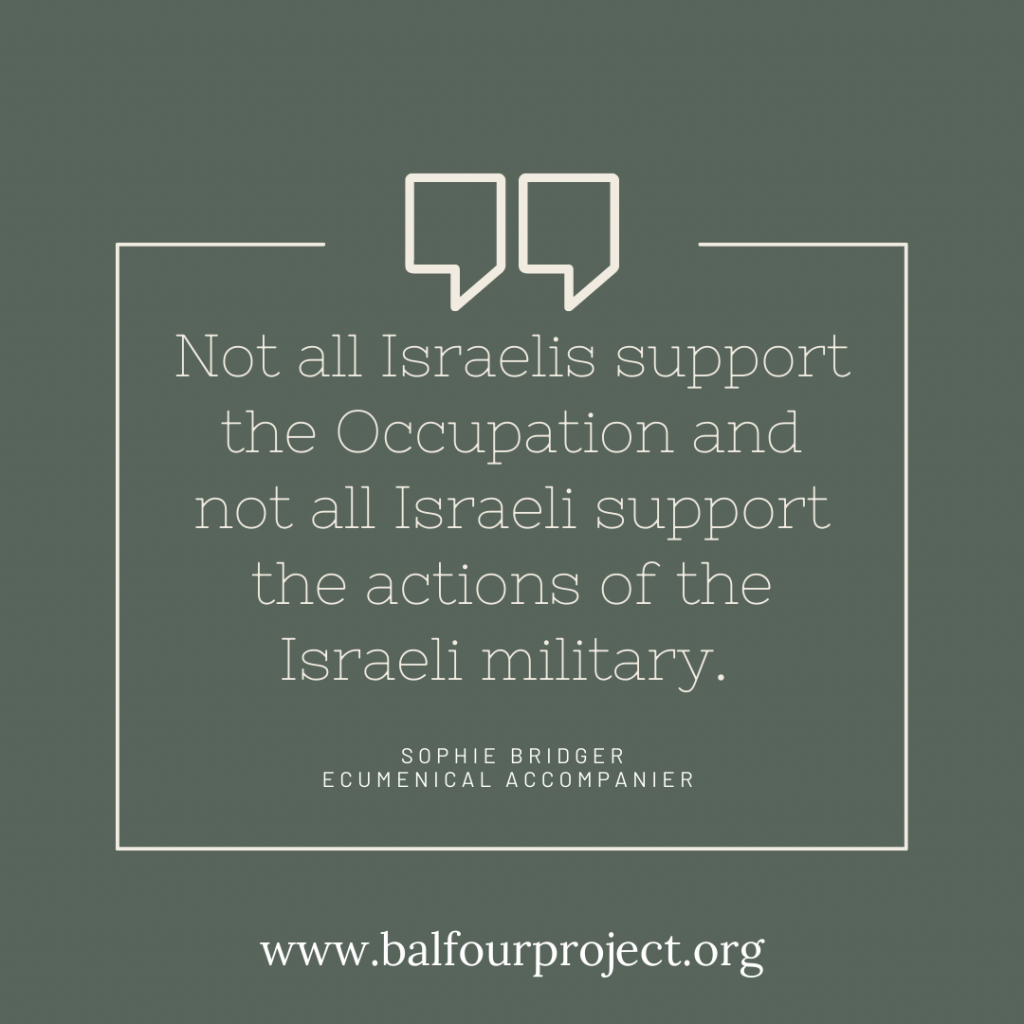
So for example, if I was talking about what I saw in the West Bank in the Northern part, I would speak to colleagues who were working in Jerusalem and they would say, ‘well, yes, your experience was this and I saw that.’ And we try and actually learn from each other as well.
Diana:
Thanks. we have got a couple of questions about provocation. A few of our viewers seem to for sure view the acts of the settlers shown in the video is clear provocation and some of the acts of these Israeli soldiers, such as poking the guns through the fence of the school and so forth. Is that how it came across to you then that that was deliberate provocation?
Sophie:
So I would say that the actions of the settlers that you saw in the video are not necessarily provocation, though sometimes they can function that way. I would say that the ones you saw there are intended to create an atmosphere of intimidation. I’ll just put a little bit of a disclaimer on this. I was in the north of the West Bank and the settlers around Yitz Har and BRACA are almost notorious for being particularly violent. There are many kinds of settlements, but they are all illegal under international law. But if you go to somewhere like Ariel, for example, Ariel has a university and essentially functions as a commuter town. It’s a very different demographic of people, but it’s when you get to places like Yitz Har and Bracha that you see people acting in very violent ways.
And I would say that their intention is more to intimidate people into leaving the area. If people then are provoked into action, that also tends to lead to an escalation, which makes things more intimidating for the Palestinians. So for example, there was an incident that I read, which again, was at Burin, where the settlers came down to the school. I believe this was last year, but it was reported by B’Tselem. You can check it on their website. The settlers came down to the school and again, started behaving in an aggressive manner. Now that could be intimidating or it could be provoking, but the response of the Israeli army was still to send tear gas into the school to disburse the situation. So that still ends up being obviously a very negative and detrimental situation. So whether the Palestinians respond to that or not as a provocation or whether they respond to its form of intimidation, if the Israeli army still comes in and sends in tear gas acid, then the outcome is likely the same, that it’s intimidating and it will encourage people to leave the area.
Thanks for that answer. From Marina Bueller-Miko, ‘It’s my understanding that the tear gas canisters are made by a factory here in Newcastle, PA, Pennsylvania. Sophie, have you or your group looked into this?’ so do EAPPI do any kind of work on that?
Sophie:
I can speak for myself. Sometimes EAPPI will encourage, for example, a wide support network to take action. So for example, if a family is being displaced, they might say, ‘Hey, would you like to take action on this point?’ But many of us take action of our own accord as individuals. I know that I have certainly looked at whether any munitions are being produced in the UK. My colleague, Jess, who you saw the back of her head in the photo, is based in the States. And I know that she has, I think, looked into something similar as well. That’s something that actually, you can have a real impact on as a citizen of your own country, to say, ‘well, actually, is there something that we’re doing as a state? Are we sending munitions to a country where they will be used against children in violation of international law?’ That’s definitely something that you can use to talk to your representatives about. If you suspect that actually something is being produced in your area, I would strongly encourage you to look into,
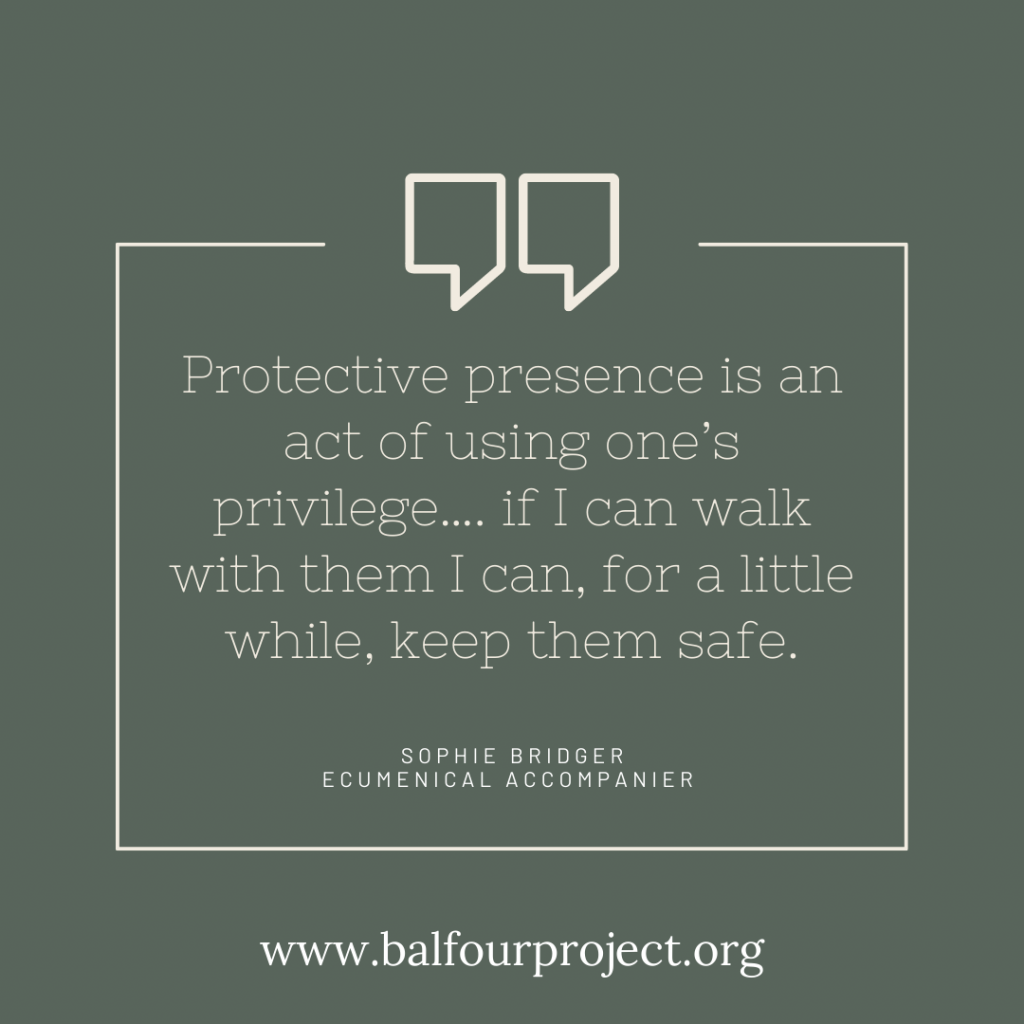
Diana:
Thank you. We’ve got a question now from Bishop Michael Doe, and I know that it came up when you were showing the video of the settler children, young people anyways, throwing stones at the village and the soldiers just hovering around. Michael Doe is a executive committee member of the Balfour Project. And he says, ‘this is no excuse, but it’s one of the reasons for the military’s behaviour the fact that many of them are also young. Afraid, and this is the first time they’ve ever met a Palestinian?’ It’s important to remember they are 18, given guns, thrown into this terrifying for them situation.
Sophie:
Yes, absolutely. Young Israelis often go through conscription immediately after leaving secondary school, either before university or just after university. So yes, many of them are very young. And we certainly met many very young soldiers. Some of whom were very bored and, sometimes they were just on their phones. And I suspect that actually some of them will have found the situation intimidating.
I think there’s a really interesting balance here. The Israeli army has also sometimes looked at this from this angle and said, these are young people who are put in a situation which scares them, which I think is valid up to a point. And I think as humans, we want to go, yes, that person is scared and therefore they’ll react. But if that person is scared and likely to react, they probably should not be put in a position of authority and power over children and should not be given a military rifle if they’re likely to use that in that way.
I think Michael makes a really important point that this may be for many of them the first time they’ve met a Palestinian, certainly in the West Bank, they may have met Palestinian citizens of Israel or Israeli Arabs, but this may be the first time that they’ve met someone who’s Palestinian before. And the narrative that is used in Israel is, as I said, very demonising.
I mean my husband have Israeli friends who I think we would consider fairly liberal. And they, for example, looked into would it be safe for their child to go and say, one of the trips that are organised to help them actually learn more about situation to meet Palestinians. And they said that at the end, they couldn’t because it just wasn’t safe. They didn’t feel that it was safe.
And that’s the kind of situation that is portrayed, that actually it is a dangerous situation and the Palestinians intend to harm Israelis as a matter of course, whereas that’s not true. For that narrative to kind of perpetuate, and then you are exposed to that your entire life, and then the age of 18, you’re given a gun and then introduced to those people for the first time. I think it’s a very toxic dynamic and there’s a lot that needs to be done to unpack that.
Diana:
And we’ve had quite a few speakers talk about the cognitive dissonance of having to do things that go against your morals. I’ve got two questions I’m going to batch together because they follow on from your video. From Monique, ‘what does the IDF gain from harassing children and making it difficult for them to learn? What’s the aim there?’ And from Cristabel Amis Lewis, ‘is so nothing to prevent or advise settlers not to go into the Palestinian villages?’
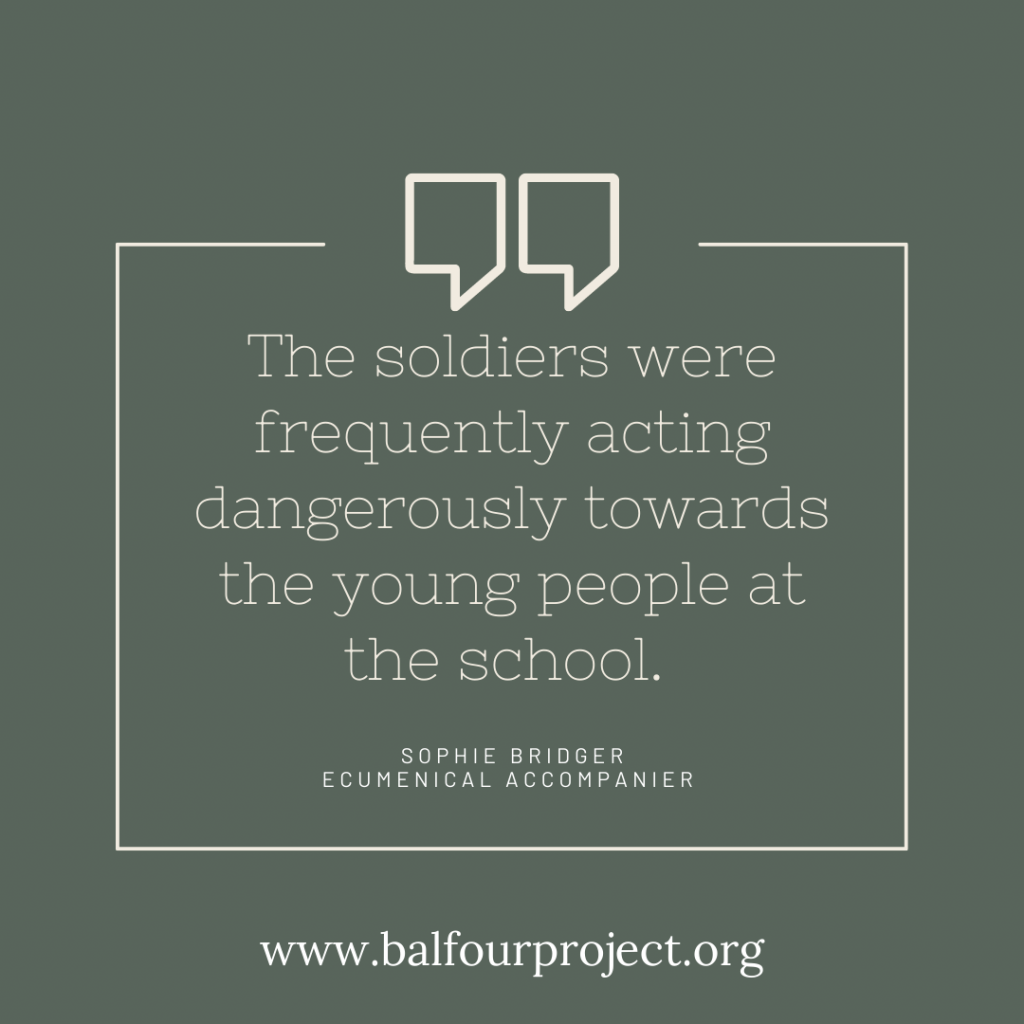
Sophie:
So the first question was what does the IDF gain? If you are really interested in what’s the culture is like inside the IDF or what Israeli soldiers are thinking in response to any of this, I really, really recommend having a look at Breaking the Silence’s resources online. They have compiled testimonies of many, many different soldiers, some of whom give testimony anonymously, some of whom advocate publicly based on what they’ve seen.
One of the things that I have read, and I went on a Breaking the Silence tour as well, and spoke to them about how they saw and what their actions and what they were being asked to do, much of this is instilling an environment where people know that they are being watched and controlled. So knowing that your children can’t go to school necessarily without them feeling safe, for example.
A similar point was used by them in one of the testimonies to describe night invasions or nights attacks, basically where Israeli soldiers would go into the houses of Palestinians randomly at night to check or collect information, which in fact they were not doing. It was used to ensure that people felt that they were being controlled, that they felt intimidated and trapped and again, to try and incentivise people to fundamentally leave. I think that is the biggest reason why.
Also one thing that’s worth bearing in mind is that if an Israeli soldier arrests a child, if a charge is actually brought against them, there’s a 99% chance that that child will end up in a military jail. So it is very easy to take someone off the streets, charge them and they will end up in military jail for maybe a year or so. So it could be that they see that as a way to basically get young people, but I would argue that it all feeds into the same strategy of intimidation and making people feel controlled.
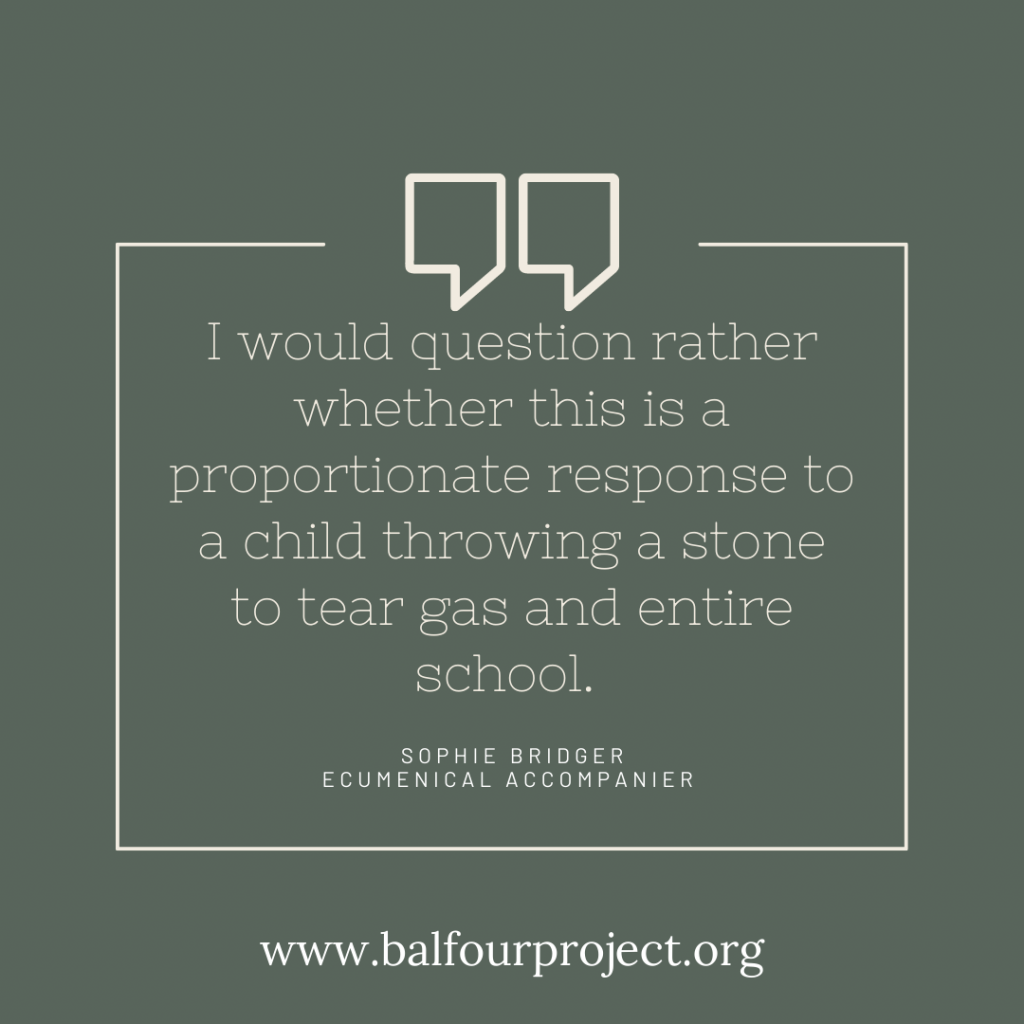
Diana:
Thank you so much for that. From Philip Francis, ‘I taught English in Bir Zeit University in the summer school in 1979 and in Hebron in ‘81 and ‘82, and then the Catholic school in Jordan in ‘82 to ’83. Listening to your excellent talk. It frightens me that so little has changed. So that is a depressing commentary for you. And we’ve got a question from in Ingrida Tatolite, ‘Sophie, thank you very much for your input. Is it possible for people from other countries other than the UK to engage in such a protective role with school children on the ground? How can they do it?’
Sophie:
Yes, absolutely. So EAPPI is actually organised by the World Council of Churches. So people take part from all over the world. In my group, we had people from America, South Africa, Germany, Denmark, Switzerland, even Australia. You don’t have to be a Christian to get involved. I’m not a Christian myself. But because it takes a human rights lens, that is a very important perspective to take, but you don’t have to be a Christian. For me it was an incredible rewarding, challenging experience that utterly changed my life. And if you are prepared to take it on it can be incredibly rewarding and I would really encourage anyone to look into that.
Diana:
It’s so unbelievably noble and I feel honored to hear you speak about your experiences as I’m sure all our attendees do as well. This is going to be the final question because we are coming to time now. This is from Brian Chapman. ‘How much notice did the Israeli army or authorities take if you or your organisation raised concerns?’
Sophie:
So it’s probably useful to talk about the ways that you can best raise concerns, on what channels you would tend to go through because you wouldn’t normally raise them directly with the army. If I was doing this in the UK, I would raise it with my elected representive, who would raise it with the Foreign Office. Basically it always goes through diplomatic channels. If I was doing it in the West Bank, I would raise it with the diplomatic services out there, the UK consulate, who would also raise it with the with their counterparts in the Israeli Foreign Office. How much notice did they take? I felt the UK diplomatic services took it fairly seriously. I can’t say that the Israeli state at the moment would be responding to those.
But I think this is a really important question. It goes back to why do we take action? What do we hope to achieve? We want to push for justice, I think all of us do, justice and peace in the whole region. We want the state of Israel to listen. We want diplomatic actors to listen. But we’re really constrained by actually what we can do. We have to use the channels that are available to us. So we talk to MPs, elected representatives and diplomats, if we have the access, because it’s the access we can take. Does it solve anything overnight? No, absolutely not. But I do think that it helps contributes, maybe not immediately, maybe over time, to a change in the way that the UK state interacts with the state of Israel, in a way that other states interact with the state of Israel. And those are still some of the only channels that we have available to us.
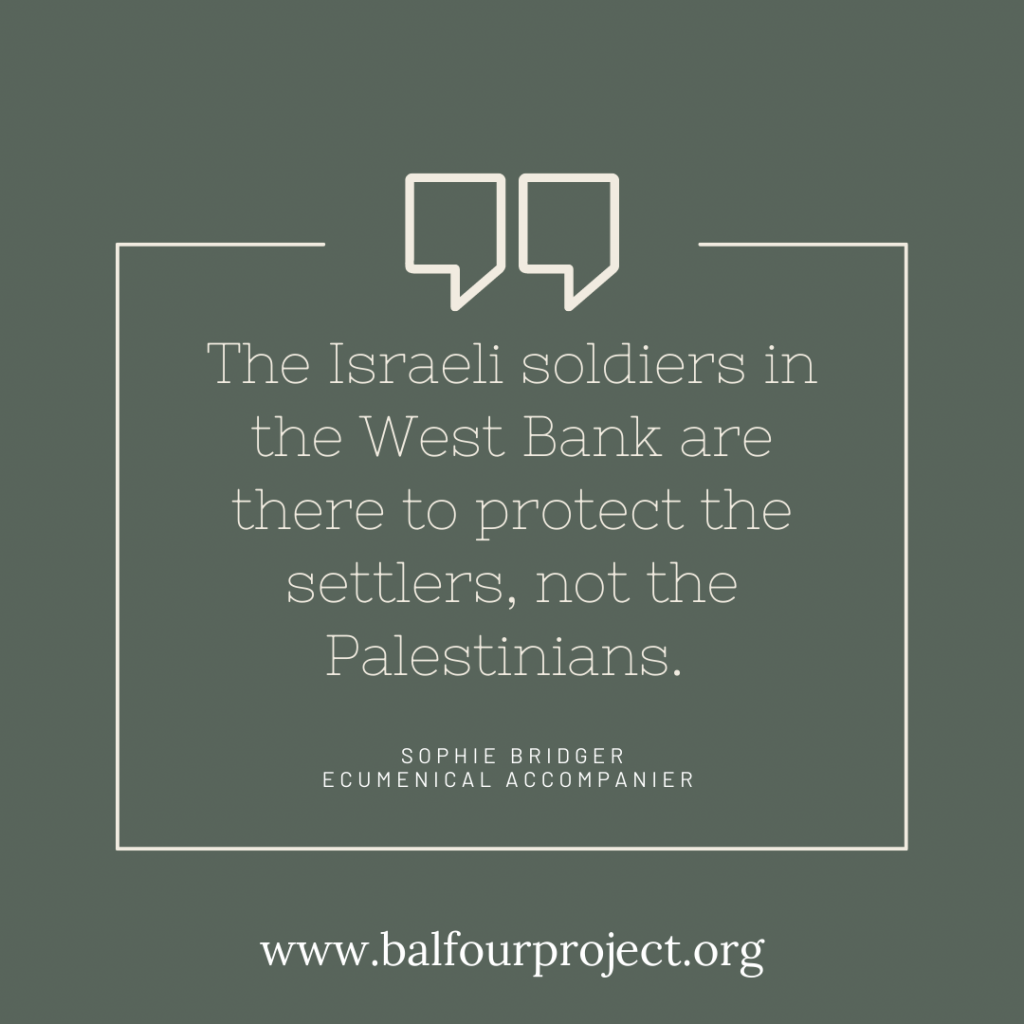
There is an investigation going on at the moment in the International Criminal Court about what’s been going on in Israel and Palestine, including in Gaza, which I think may lead to some accountability for what’s happened. But talking to your elected representatives is still a really important way to try and get things done, even when change is slow and gradual, it does eventually make a difference. I do believe that.
Diana:
And more on the ICC and its role in Israel and Palestine, we have the recordings of our conference that we had in may on that topic. So please do check that out here, it was fascinating to hear from different perspectives on all sides.
I’m going to end on some lovely comments that because I like to try to end on an optimistic note, which can be hard sometimes, but I have managed to find some very positive things from the chat box. So thank you everyone. So from Fahed Abouakel, ‘in 2003, a Presbyterian pastor from Florida volunteered in your programme, the EAPPI program, and they asked him to live with the family and Al-Khalil/Hebron. And the experience of this pastor helped change the Presbyterian Church USA policy towards Israel/Palestine. So I think that’s a really lovely example there of how the EAs can actually come back and create some change on the ground in their communities. That just warmed my heart a bit.
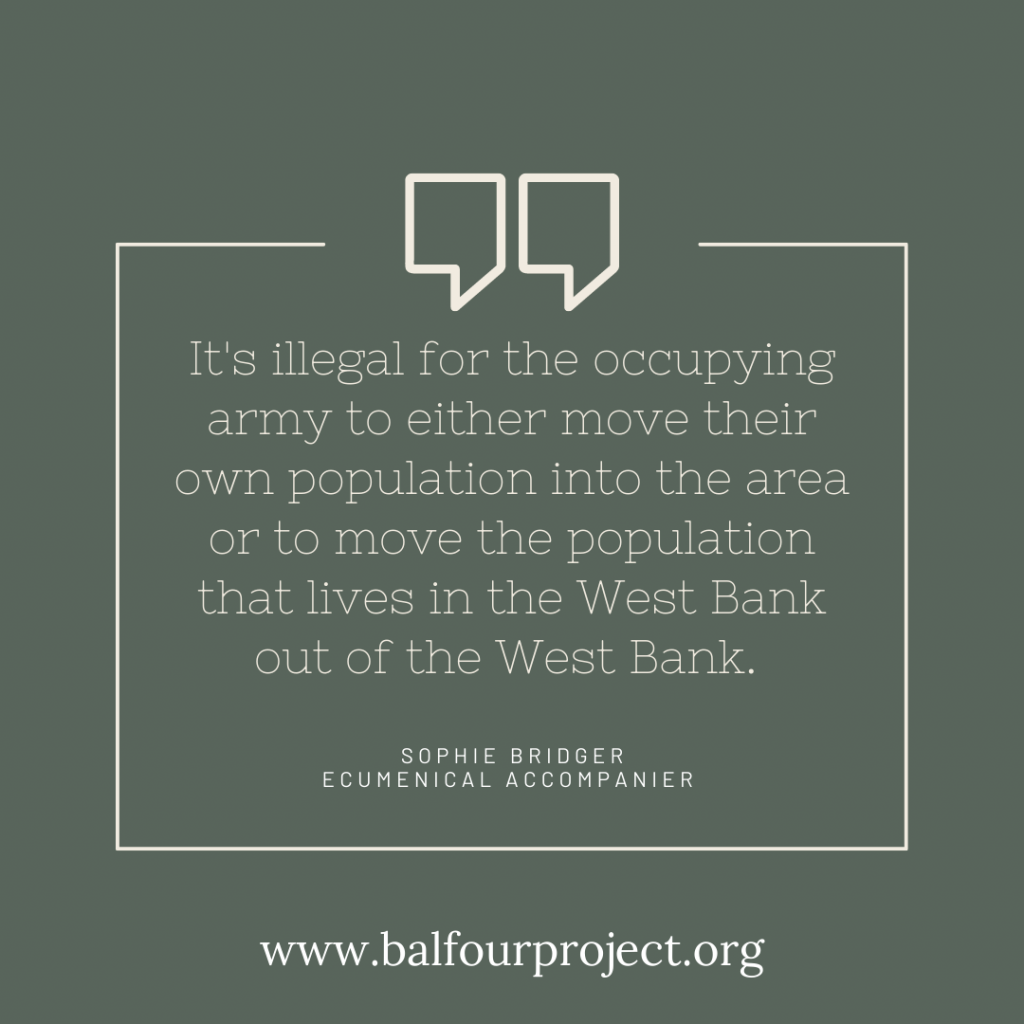
From Abigail Metzker, ‘Sophie, this was wonderful. I feel pretty informed, but this shed a very intimate light on what is going on. Your presentation style is perfect for bringing people into this terrible situation. You’re a great spokesperson.’
I agree wholeheartedly. And I’m going to end on this. From Farishtey Khateeb Shahidi, ‘most grateful for your input and I’m encouraged to volunteer as a witness. Thank you.’
So if we could get one witness out of this, that would be amazing, wouldn’t it?
Sophie:
That would be phenomenal.
Diana:
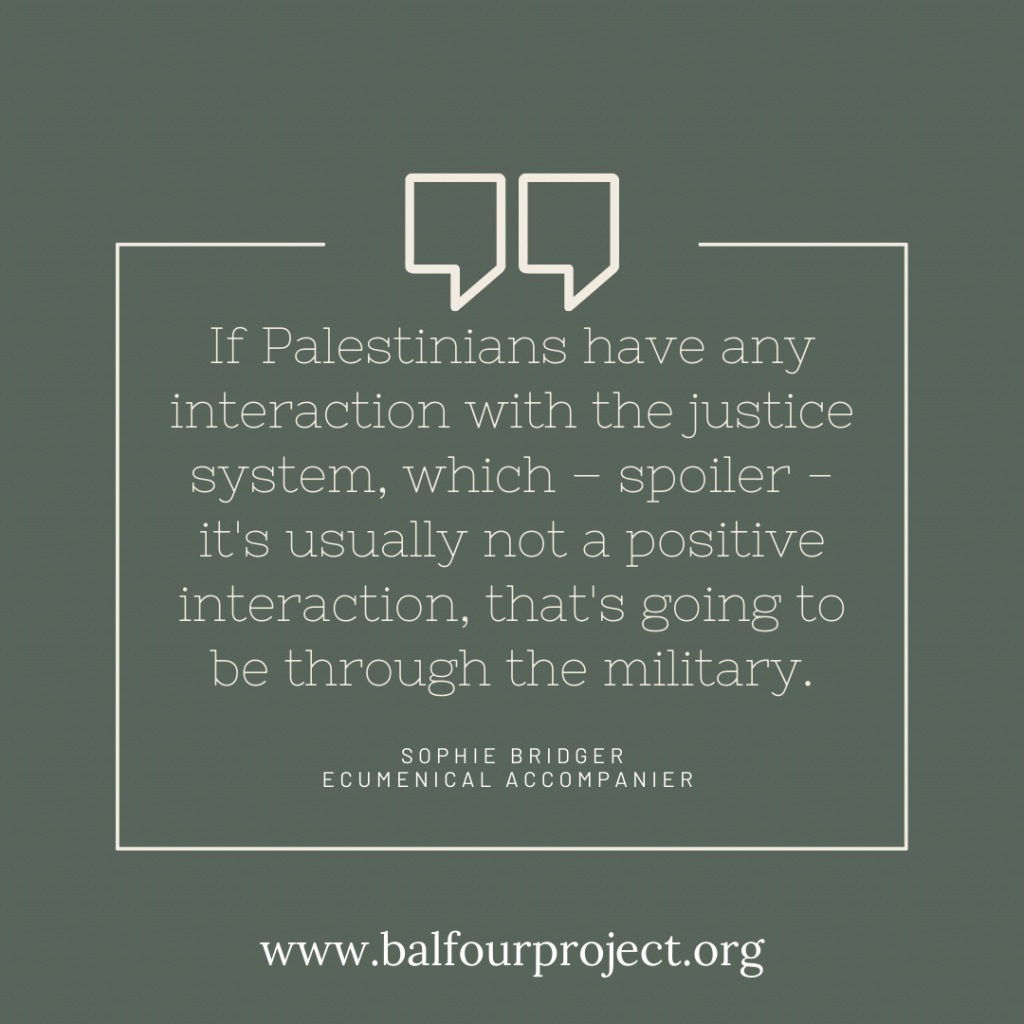
Please do email us if you would like more information and can probably put you through to Sophie so she can advise further. And just want to say again, thank you everyone for attending.
